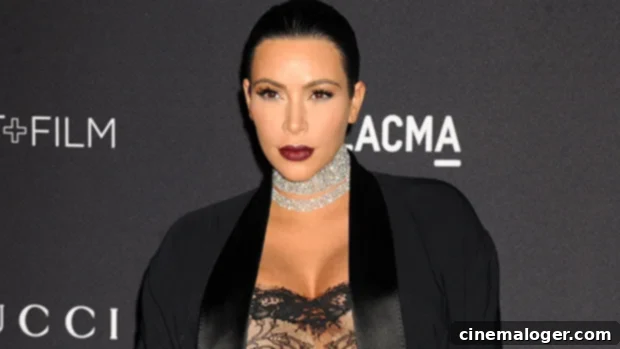Kim Kardashian’s Journey: From Pregnancy Body Shaming to Shapewear Entrepreneurship and Cultural Accountability
Even years after her most recent pregnancy, Kim Kardashian candidly recalls the intense public scrutiny and harsh criticism she faced regarding her weight gain. In a revealing interview with the Wall Street Journal, the reality television mogul and businesswoman opened up about the lasting impact of those experiences on her self-perception, security, and entrepreneurial drive. Her journey highlights the unique pressures faced by women in the public eye, particularly concerning body image, and how these personal struggles can fuel a desire to create impactful solutions.
Kim Kardashian has often spoken transparently about the significant weight she gained—approximately 60 to 70 pounds—during her pregnancies with her first two children, North West and Saint West. She admits that the memories of that period, and the public’s reaction to it, continue to haunt her. “It changed my body, my skin,” she shared with the Wall Street Journal. “I got photographed from every angle. All I have to do is [Google] Kim Kardashian and [killer whale] Shamu. That really changed my security. It broke my soul for a while.” This painful comparison, widely circulated online, became a symbol of the cruel and relentless body shaming she endured. The emotional scars ran deep, impacting not just her confidence but also her sense of safety and privacy in a world constantly watching her.
Beyond the public’s judgment, Kim also grappled with serious health complications during her pregnancies, most notably placenta accreta. This condition, where the placenta grows too deeply into the uterine wall, can lead to severe blood loss and other life-threatening issues during childbirth. Given the significant medical risks involved, Kim and her husband, Kanye West (now Ye), made the difficult decision to use surrogacy for their subsequent two children, Chicago and Psalm. This choice underscored the severity of her prior medical experiences and her commitment to prioritizing her health and the well-being of her growing family. Her personal health battles, combined with the relentless public scrutiny, have undoubtedly shaped her perspective on body image, self-acceptance, and the importance of supporting women through various life stages.
Addressing the Kimono Controversy: A Lesson in Cultural Sensitivity
In her insightful Wall Street Journal interview, Kim also delved into the launch of her then-new “solutionwear” line, which initially faced significant backlash due to its controversial name: Kimono. The choice of name drew widespread criticism from around the world, particularly from the Japanese community, who deemed it culturally insensitive. The kimono is a revered traditional Japanese garment, a symbol of heritage, art, and identity that dates back centuries. Many felt that using the name for a contemporary shapewear brand was an act of cultural appropriation, disrespectful to its historical and cultural significance, and an attempt to commodify a sacred cultural icon.
The public outcry was swift and immense. Petitions were launched, social media was ablaze with protests, and the mayor of Kyoto, Japan, even sent a letter to Kim Kardashian urging her to reconsider the name. Reflecting on the controversy, Kim admitted her oversight. “You would think we would have obviously thought it through a little bit deeper,” she conceded. “I’m the first person to say, okay, of course, I can’t believe we didn’t think of this. I obviously had really innocent intentions. But, let’s listen. And I really want to listen. And I really want to take it all in.” This statement marked a crucial turning point, demonstrating a willingness to acknowledge error and engage with critical feedback, rather than dismiss it.
The experience forced Kim and her team to halt the product’s release and embark on the challenging task of finding a new, more appropriate name. This period of reevaluation wasn’t just about rebranding; it was a profound lesson in global cultural awareness and the responsibilities that come with building a worldwide brand. The incident highlighted the complexities of operating in a global marketplace, where cultural nuances and historical contexts must be carefully considered. Ultimately, after much deliberation and extensive public engagement, the brand was successfully relaunched under the new name, SKIMS, a decision that was largely met with approval and demonstrated Kim’s commitment to cultural accountability.

The Responsibility of a Public Persona: Learning and Growth
Kim Kardashian’s journey through public scrutiny, both personal and professional, has led to a significant realization about her role as a high-profile figure. She openly acknowledged that she “takes responsibility” and is committed to “doing the right thing,” especially given the immense spotlight on her and her ventures. “I do realize that there might be more eyes on me and my brand,” she explained. “And so I have to tune it out and really learn and really grow and have to realize that maybe there is a different standard.” This reflection underscores a maturing perspective on fame and entrepreneurship, moving beyond mere celebrity endorsement to a more thoughtful approach to brand building and public interaction.
Being under constant public observation means that every decision, every statement, and every product launch is dissected, debated, and judged. For Kim, this has meant adopting a proactive stance toward learning from mistakes and evolving with global sensibilities. The Kimono controversy, in particular, served as a stark reminder that even with innocent intentions, cultural impact can be significant and far-reaching. Her willingness to listen to criticism, rather than becoming defensive, marked a pivotal moment in her public career, demonstrating an admirable capacity for growth and self-correction. This commitment to adaptability and cultural sensitivity is not only beneficial for her brand but also sets an example for other public figures and entrepreneurs.

SKIMS: A Vision for Inclusive Shapewear and Body Confidence
At its core, Kim Kardashian’s motivation for creating her shapewear line (now known as SKIMS) stemmed from a deeply personal desire to offer an inclusive and diverse range of products that genuinely cater to all body types and skin tones. She envisioned a brand that would empower individuals to feel confident and comfortable in their own skin, a stark contrast to the feelings of insecurity she herself had battled publicly. Her personal experiences with body image, coupled with her extensive knowledge of fashion and undergarments, positioned her uniquely to address a significant gap in the market.
Kim revealed that she wears shapewear “all the time” but consistently struggled to find brands that offered the specific support, sculpting, and comfort she desired. Many existing options were limited in size, shade, and effectiveness, often failing to address the diverse needs of women. “I wanted to branch off and do my thing,” she stated, fueled by a genuine belief in the necessity of her product. “I’m like…ok! Everyone needs this! underwear, bras — this is what people wear every day.” This simple yet powerful realization became the driving force behind SKIMS.
Her vision for SKIMS was comprehensive: to create solution-oriented shapewear that not only smooths and lifts but also feels like a second skin. The brand launched with an extensive array of sizes, from XXS to 4XL (which has since expanded to 5XL), and a wide spectrum of skin-tone shades, ensuring that more people could find pieces that truly matched their complexion. This commitment to inclusivity resonated deeply with consumers who had long felt overlooked by the mainstream shapewear industry. The initial pricing strategy, with pieces ranging between $22 and $98, also aimed to make high-quality, effective shapewear accessible to a broader audience, defying the notion that such specialized garments must be prohibitively expensive.
Ultimately, Kim Kardashian’s journey from confronting body shaming during her pregnancies to navigating cultural appropriation controversies with her business ventures illustrates a continuous process of learning, adaptation, and growth. Her candidness in interviews, her willingness to take responsibility, and her dedication to creating inclusive products reflect a public figure who is not only a savvy entrepreneur but also one who is increasingly attuned to the complexities of her influence and the importance of fostering a positive impact on her audience and the world.
